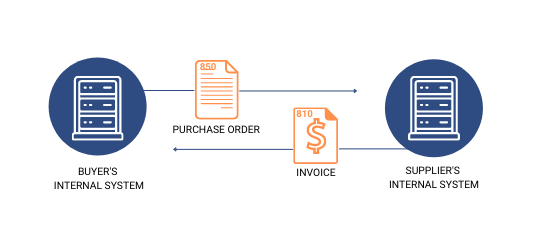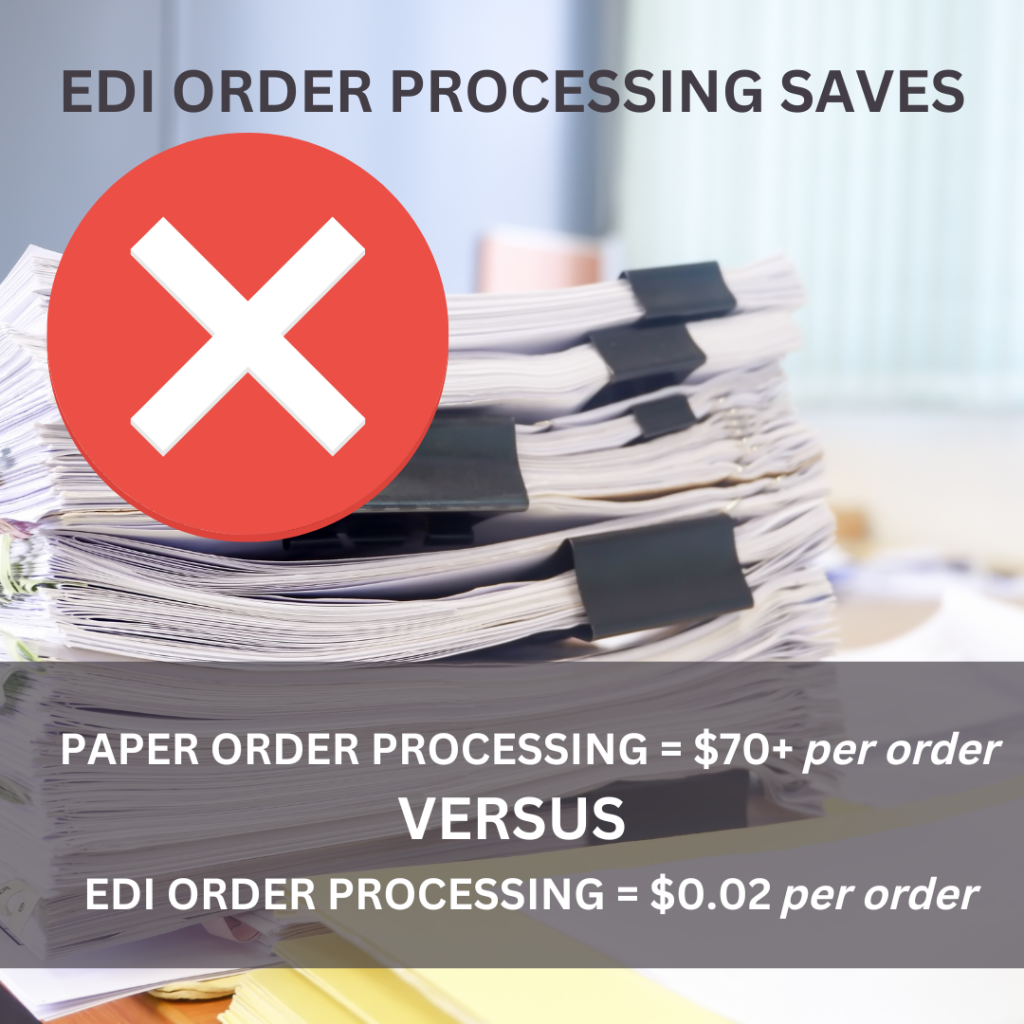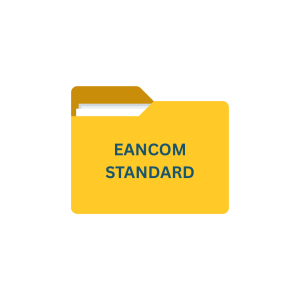Introduction
Before getting started with EDI order processing,
First, let’s define,
What is EDI? – EDI stands for electronic data interchange which is a standardized way that businesses exchange information.
EDI automates orders flowing in and out of the supply chain with ease without manual intervention. It helps connect all involved parties i.e., suppliers, logistics providers, and retailers. Many large retailers require their suppliers to use EDI because it enables transactions to be completed seamlessly through electronic automated, means.
There are many reasons why you should start using EDI Order Processing today.
Save Time
Eliminate Errors
Improve Customer Service
Reduce Costs
Stay Organized
Focus on What Matters Most
Grow Your Business
EDI Order Processing Workflow

Before EDI, companies used to depend on paper-based communications to send and receive invoices, confirmation receipts, and a few other documents that were sent via mail/courier. This process often leads to errors and delays in order processing and finally leads to dissatisfied customers and loss of money to the business.
EDI helped businesses replace this manual process and automate the document exchange process electronically using a point-to-point connection or EDI VANs (value-added network).
Here is an example of how EDI order processing works,
- In the first step, a buyer sends the purchase order (EDI 850) to the supplier.
- After the supplier receives the purchase order, they will send an acknowledgment document (EDI 855) to the buyer followed by the invoice (EDI 810).
- Then a buyer may receive a shipment notification from the warehouse (EDI 940) indicating they will receive their order from a particular warehouse.
- Once the items are ready for shipping, the buyer will receive an advance ship notice (EDI 856) which will inform the buyer that the shipment is on the move to the destination.
Benefits of EDI Order Processing


EDI Order Processing allows you to automate your entire order processing workflow, so you can focus on growing your business instead of spending time on manual tasks.
1. Improve Relationships with Trading Partners
Being EDI compliant helps you do business with all major retailers, as most of them require their suppliers to be EDI compliant to do business with them. With EDI in place, you can build trust and credibility with your retail trading partners.
2. Reduce Missing Orders
With EDI never worry about missing an order. EDI ensures that all your orders are processed accurately, with a confirmation at each stage of the order cycle.
3. Adding New Customers is Easy
Adding new customers will be easy as you will be working with a full-service EDI provider, they would already have established relationships with all major retail partners and will have all the mappings and other requirements ready and it will be easy to connect with any retail partner easily.
4. Reduce Order Processing Errors
When orders are processed manually there might be a few errors which can lead to costly chargebacks from retailers and sometimes even cause a legal problem. With EDI, you can eliminate these costly errors and automate the entire order processing.
5. Resource Reallocation
Once you eliminate the manual order processing, your team will have more time and you can reallocate the resources to another business process.
Conclusion
Leveraging Electronic Data Interchange (EDI) for order processing represents a transformative step towards automation and efficiency in business operations. EDI streamlines the exchange of order-related information, automates manual tasks, and enhances accuracy throughout the order processing cycle. By adopting EDI, businesses not only optimize their internal workflows but also foster faster, more reliable communication with trading partners, ultimately contributing to improved customer satisfaction and a competitive edge in the market.
Enable EDI order automation with Commport EDI Solutions
Need Help? Download: EDI Buyers Guide
Unlock the full potential of your supply chain with our comprehensive EDI Buyer's Guide — your first step towards seamless, efficient, and error-free transactions
Frequently Asked Questions
EDI automates order processing by facilitating the electronic exchange of order-related documents between businesses and their trading partners. It eliminates manual data entry, reduces errors, and accelerates the order fulfillment process.
Yes, EDI can be seamlessly integrated with existing order management systems. It is designed to interface with various software solutions, ensuring compatibility and efficient data exchange.
EDI enhances accuracy by eliminating manual data entry, reducing the risk of errors associated with paper-based processes. It ensures that order information is standardized, consistent, and easily interpretable by both the sender and receiver.
No, EDI benefits businesses of all sizes in order processing automation. Its scalability allows both small and large enterprises to streamline their order processing, reduce costs, and improve overall efficiency.
Yes, EDI facilitates real-time tracking of orders by providing timely updates on order status, shipment information, and other relevant details. This enhances visibility into the order fulfillment process and enables proactive decision-making.
Request a free quote
Table of Contents
Sign up for our Newsletter
Read More
RosettaNet EDI Standard: From Basics to Expert Implementation
Introduction Over 300,000 companies worldwide rely on EDI standards for...
Read MoreThe Essential Guide to OCR Technology: Turn Your Paper Documents to Digital in Seconds
Introduction Optical character recognition technology bridges the gap between physical...
Read MoreHow Customs Brokers Use EDI: Essential Guide for Trade Compliance
Introduction Since its first implementation in the 1970s, EDI helped...
Read MoreEANCOM EDI Standard: From Basics to Expert Implementation
Introduction The global EDI market is projected to reach $4.52...
Read More




